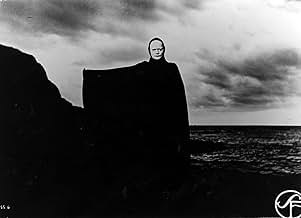Un homme cherche des réponses sur la vie, la mort et l'existence de Dieu en jouant aux échecs contre la Faucheuse pendant la peste noire.Un homme cherche des réponses sur la vie, la mort et l'existence de Dieu en jouant aux échecs contre la Faucheuse pendant la peste noire.Un homme cherche des réponses sur la vie, la mort et l'existence de Dieu en jouant aux échecs contre la Faucheuse pendant la peste noire.
- Récompenses
- 9 victoires et 2 nominations au total
Siv Aleros
- Flagellant
- (non crédité)
Sten Ardenstam
- Knight
- (non crédité)
Harry Asklund
- The Landlord
- (non crédité)
Benkt-Åke Benktsson
- Merchant at the Inn
- (non crédité)
Histoire
Le saviez-vous
- AnecdotesIngmar Bergman credited the film with helping him overcome his crippling fear of death. Because the film dealt so overtly with the subject, he found it a highly cathartic experience.
- GaffesThe chess players focus on capturing the Queen. The Queen was not a super-powerful piece until centuries later when a recent chess-variant initially called "chess of the mad queen" became more popular than the classic game.
- Citations
Antonius Block: We must make an idol of our fear, and call it god.
- ConnexionsEdited into Vikings (2007)
Commentaire à la une
The mysteries of religion and death have long been a popular focus among artists of all media, including film. And while many films question these mysteries, they seldom provide any real insight into the world of the unknown. In Ingmar Bergman's THE SEVENTH SEAL, these mysteries are not only questioned; they are dissected, splayed, and scrutinized.
THE SEVENTH SEAL could very well serve as sort of a manifesto for existentialism. Its deep acuity and haunting imagery is powerful enough to jar even passive viewers out of their complacency and force them to examine their own reality. The delicately crafted story centers around a 14th century knight named Antonius Block and his ongoing game of chess with a shadowy, hooded figure: Death. Bergman uses this allegory not just to personify death, but to illustrate the lengths man will go to in order to avoid it. In the end, however, Death is a much better player than any of us, and though he may humor some of his opponents by letting them think that they have the advantage, the end result is inevitable: Death always wins. No matter how skillfully we plan our moves or how determined we are to win, we can never beat Death.
In Antonius's search for answers, he encounters a variety of very unique characters, each with their own outlook on life, death, faith, fear and love. Their commentary on such matters is often dryly funny and always brilliant, continuously and effectively challenging our perceptions of the world around us. For me, the dialogue was definitely the high point of the film, as it was extremely thought-provoking and carefully constructed throughout. Almost every line spoken is, in one way or another, daunting and unforgettable. Jöns's description of love as "the blackest of all plagues" is a quote that will forever be engraved in my mind.
THE SEVENTH SEAL truly is a remarkable accomplishment in the world of cinema. It is a deep, mesmerizing, and darkly beautiful work of art. More importantly, THE SEVENTH SEAL is one of those rare movies that doesn't just entertain, but also has the power to change the way one thinks.
THE SEVENTH SEAL could very well serve as sort of a manifesto for existentialism. Its deep acuity and haunting imagery is powerful enough to jar even passive viewers out of their complacency and force them to examine their own reality. The delicately crafted story centers around a 14th century knight named Antonius Block and his ongoing game of chess with a shadowy, hooded figure: Death. Bergman uses this allegory not just to personify death, but to illustrate the lengths man will go to in order to avoid it. In the end, however, Death is a much better player than any of us, and though he may humor some of his opponents by letting them think that they have the advantage, the end result is inevitable: Death always wins. No matter how skillfully we plan our moves or how determined we are to win, we can never beat Death.
In Antonius's search for answers, he encounters a variety of very unique characters, each with their own outlook on life, death, faith, fear and love. Their commentary on such matters is often dryly funny and always brilliant, continuously and effectively challenging our perceptions of the world around us. For me, the dialogue was definitely the high point of the film, as it was extremely thought-provoking and carefully constructed throughout. Almost every line spoken is, in one way or another, daunting and unforgettable. Jöns's description of love as "the blackest of all plagues" is a quote that will forever be engraved in my mind.
THE SEVENTH SEAL truly is a remarkable accomplishment in the world of cinema. It is a deep, mesmerizing, and darkly beautiful work of art. More importantly, THE SEVENTH SEAL is one of those rare movies that doesn't just entertain, but also has the power to change the way one thinks.
Meilleurs choix
Connectez-vous pour évaluer et suivre la liste de favoris afin de recevoir des recommandations personnalisées
Détails
- Date de sortie
- Pays d’origine
- Langues
- Aussi connu sous le nom de
- The Seventh Seal
- Lieux de tournage
- Hovs Hallar - Naturreservat, Skåne län, Suède(Opening beach scene and ending scene)
- Société de production
- Voir plus de crédits d'entreprise sur IMDbPro
Box-office
- Budget
- 150 000 $US (estimé)
- Montant brut mondial
- 311 212 $US
- Durée1 heure 36 minutes
- Couleur
- Rapport de forme
- 1.37 : 1
Contribuer à cette page
Suggérer une modification ou ajouter du contenu manquant

Lacune principale
What is the streaming release date of Le Septième Sceau (1957) in Australia?
Répondre


































